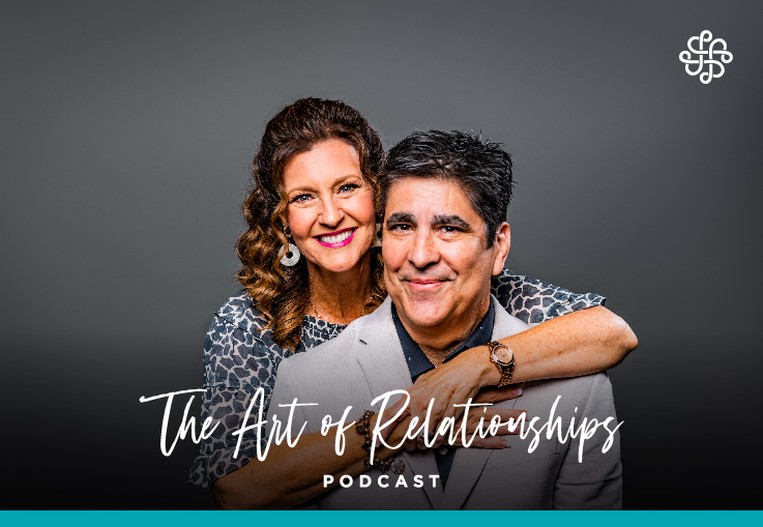The Do's And Don'ts Of A Breakup
Chris Grace, Tim Muehlhoff - June 20, 2018
Topic: Dating, Love, Relationships, Romance

Tim Muehlhoff: Welcome to another Art of Relationships podcast with Tim Muehlhoff. Good to be here, Chris!
Chris Grace: I'm Chris Grace. We get to talk to you about all things relationships on this podcast. Tim, we've been talking a lot about relationships that were good at one point and then some things come in and the relationship sours. Listeners have written in about when that occurs, how do they end a relationship given that sometimes it just is not meant to be. Other times, there are clear signs that a relationship is in trouble and then we need to talk some and they have that conversation about how to end a relationship and how to end it well. Even the struggle that they're having, is this a relationship that should end, I don't know. Tim, what do you think? Let's talk about how do you end a relationship well and what are the signs of an unhealthy relationship that require you to take that step.
Tim Muehlhoff: All of us know stories, Chris, of relationships that didn't end well. These are the hard stories of people's hearts really getting broken, having a lingering effect, the breakup. Again, we're not going to be idealistic. A breakup is just a hard thing to do and feelings are going to, to a certain degree, just get hurt, but how can we minimize that? Maybe it'd be good to start by saying, Chris, what are the signs in a dating relationship that maybe this should end. I think listeners might benefits from understanding from a communication and psychological standpoint, what are some of the tell tale signs that this just isn't working out.
I'll start from a communication side of things. In a dating relationship, it's good to have expectations. It's good to know what you want out of a relationship. Sometimes those expectations are idealistic. Sometimes those expectations are wildly out of wack. It's good to come up with ... here are the things I want out of a relationship. I expect to spend time together. I expect me to be a priority, within reason, within the relationship. I expect us to resolve conflict. I expect that we will do ministry together if it's a Christian relationship. Know what those expectations are and as you're in the relationship, it is good to take inventory every once and a while to say, I've got a bunch of expectations that just are not being met. Over time, maybe you can rectify that, but as the dating process goes on, you just realize, man I've got to tell you, there's just some things I really hoped this relationship would provide and it seems like one, it's not happening naturally or two, I have to manipulate it to happen. Let's say an expectation is we spend time together. I have to nag you to get you to put me in your schedule. I would say that's a sign that this relationship isn't firing on all cylinders and if that continues, it probably should end.
Chris Grace: There will be clear times where an expectations that you have, that the relationship that you've established, you're even pretty explicit about it with yourself and with your partner. You've listed these and they're not being met. Those are clear.
There's also situations and times in which a person's heart simply changes. They don't feel the same sort of attraction that they did at one time. Intimacy seems to fade. Degree of connection seems to fade. Those seem to be a little harder because there might be good expectations that are being met that are the right ones ... you have a similar heart, you have similar interests and values, even your communication is good, but something has happened. It's clear now, to one or both, that there's been a change. To try to figure that out and navigating that as well.
Tim Muehlhoff: We have two broad categories we think about: friends of the road and friends of the heart. Friends of the road we just happen to be one the same point in our journey. We see this because we deal with undergraduates in college that they're doing great and then summer break comes. Now they're away from each other and one person just tends to lose interest. Their heart changes. Or, one graduates and now what you had in common is, hey great, we're all students at this university. We had the same schedule and same fun things that we did. We all cared about our classes, but now somebody's graduated and now no longer is the road the same. Now are you friends of the heart, which means these deep heart commitments really can live past long distance and things like that.
I think you're right. People change. Transitions happen. Don't feel guilty about that, right? It's like I'm sorry I was committed to you. This is a great argument for not over-committing. Seasons change and people's hearts change and that's okay to allow natural progressing of things to happen.
Chris Grace: Tim, then, in this natural progression then, some listeners are going to say that this has either happened to them or they're in the middle of this. There are some good ways and some bad ways to end these things. I can communicate that very thing to somebody and say, "my heart has just moved and changed ..." well, depending upon our level of intimacy, depending on our relationship, that could be a difficult conversation. There are some good ways to have that conversation and some not so good ways. Do you want to talk a little about that? I know one that goes on now that is clearly in the wrong or bad category. It's what is called, ghosting. A person just simply disappears. They become a ghost. There's no warning. This relationship all of the sudden now means the other person's disappeared and they become a ghost. It's called ghosting. We know that's not the way to do this. It's very important to avoid that, but it happens.
Tim Muehlhoff: That's just a lack of maturity. I just disappear on you. I no longer return your calls. That's just not a healthy way to do it.
Chris Grace: They did a study, it was actually a Canadian study, and they were looking at people who were in relationships. The study was studying this phenomenon called, post-relation contact and tracking. They were using like 270 college students and asking them about a recent breakup, it's intensity compared to earlier or different splits. Then, they wanted to ask them about what was good and difficult, what was the wrong way to do it. They concluded a couple of things.
First of all, they found that individuals, they experienced more distress after a breakup, and the more distress the more effort they put into reconnecting or trying to stay in touch with their partner. In other words, the harder the breakup, the more likely they were to be tempted to stay connected, to reconnect with somebody, to contact them. In worst cases, it would get to stalking. In that case, they just found that some of these couples had an inability to pull out of the relationship well. Their pain came into play. So, Tim, there are just some ways not to do this. That would be one, the ghosting, of course of the extreme, the stalking, right? If you can't pull out of this relationship you probably will be best served by not attempted to reconnect and stay with somebody.
Also, there are some other negative ways, right? Bad mouthing is the study where you just now say things about the other person to their friends or to others. What else comes to mind for you?
Tim Muehlhoff: Blaming the other person. Saying, "hey, this is your fault. This is what you did and you did." Again, another one would be casting a negative view over everything that person is. Instead of remember the good times, you now only talk about the bad times. Those are harsh breakups.
There's a communication scholar named Leslie Baxter who studied, several studies, asked individuals to describe the behaviors that made for a good breakup or a bad breakup. She actually found 40 different characteristics but broke it up into four different categories. One category that was good was positive tone. Thinking about the feelings of the person you're about to talk about the breakup with and protecting those feelings. Next was openness. Strategies that communicated, clearly, what the reasons were. Again, I think people are owed that. Just say, "hey, I'm sorry, I'm no longer into us anymore" is just not good.
Chris Grace: That also comes in this idea of it's a sign of respect that you should keep the other person's dignity. You help, in essence, I guess, your own respect, but maintaining or saving face we would call it in this relationship.
Tim Muehlhoff: Another negative one, and I see this all the time, I would call this a pseudo-breakup. Yeah we break up, but I'm still popping over. I'm still expecting things from you. I'm still keeping the lines of communication open. I'm not saying it couldn't get to that point, but there needs to be a transitional period. Hey, we broke up, which means I'm not going to be a part of your daily schedule. We might see each other at common functions, but it's kind of manipulating the person to say, "hey, I want to kind of officially breakup, but I still want the emotional connectedness or to your time." That's just not fair to the person that's being broken up with.
Chris Grace: I think of another one that's probably on the bad side as well. Not just thinking about the relationship as an all bad, but then, limiting that to thinking you're all bad or you're the one. This whole self blame. Ultimately it is no doubt going to be the responsibility, and each carries some weight in this, but there are some people who breakup badly and then turn that inward. They just simply can't forgive themselves and they feel guilt. This idea of their role in this is why it led to it. That can spell trouble for even future relationships if you're ... [crosstalk 00:11:05]
Tim Muehlhoff: Your emotions are going to be out of wack for a while. We're talking about how to break up well. The well part, let's be real and think about the well part. Every break up is going an emotional toll. If it doesn't take an emotional toll, then you just weren't invested in it.
I dated someone for a long period of time and we broke up. I remember, Chris, I was just distraught, I thought it was a good idea but I went to go see 'The Color Purple.' I'm by myself in this theater, Chris. I didn't even know what 'The Color Purple' was about, I just picked a movie and wanted to get my mind off it. I'm sitting alone in a dark theater. Those of you who don't know 'The Color Purple' is based on an Alice Walker novel. There comes this fairly emotional time where this one woman reads letters from her long lost sister. Whoopi Goldberg is reading the letters. I am weeping. Weeping in the theater, seriously. Complete strangers are turning around handing me Kleenexes. Chris, I swear to you. I just thought it was a good idea. [inaudible 00:12:11] the best thing.
Oh, I was a mess. In some ways, I think that's healthy. It means that the relationship mattered to you. You cared about it. You invested in it. Give yourself time to grief. I think that's realistic, even if you do it well, there's going to be some things that we need to expect when we do these break ups.
Here are certain things for us to talk about, kick around about. Things to do well. The first one I think is really important. Find time to talk face to face with this person you are going to break up with. I do this experiment with my comm students. I say, "how many of you have in a dating relationship?" And they raise their hand. I say, "what if this person broke up with you and it was incredibly worded, it was thoughtful through text, a text message." They're like, no, no. I say, "Whoa, whoa, whoa, whoa, this is thoughtfully written." They're like, no not going to work. Find time to do it face to face I think is incredibly important.
I think this is so good. Tell the person that you don't regret spending time with them. I would recount the positives to say, "hey, this was important to me, I learned this from you, I think this was good, I think this was helpful." That kind of stuff I think is important.
Chris Grace: Tim, as we talk about some of these, we have to recognize that these are emotionally painful moments for people especially for the person who maybes not suspecting this. Those kinds of conversations may be difficult. In some cases, when there has been betrayal or a lack of trusts or other kinds of behaviors then the break up isn't as difficult. In cases in which, maybe it's just a changing of [crosstalk 00:14:10] value or an intimate kind of connection, then it becomes even more painful to do this.
Another way of doing this well is taking that longer view of relationships, that is, you know in the long run I could use some of these things that have happened to me for my own development and growth so this pain isn't going to endure forever. It goes away. Knowing that can also help you process better.
Tim Muehlhoff: Yes, I love all of that. When the time comes to sit down and have the conversation, don't rely on subtext. Subtext, to me, is a way of avoiding the hard conversation. Just saying, "hey, do you think we're working well? Do you think we're best for each other?"
By the way, the two things I mentioned, finding a way to talk to a person face to face and then actually conveying that you do want to break up, don't switch that order. Even talking about the positives, we've all had this conversation when we've dated somebody that says, "hey, I just want you to know, I really think you're a great guy. You really mean a lot to me." I'm thinking, "oh, nuts. You're going to break up with me." That's subtext. It's best to say, "listen, I need a break." I think it's fine to take a break. I need to think about things. When you sit down face to face, I think it's best to be honest. I think it's best to be direct. Don't be overly negative. Talk about the positives. Don't blame that person. Then, allow that person to vent. Allow that person to talk and voice hurts.
Chris Grace: Tim, how much do you believe, for a good break up like this, you need to be prepared and ready to understand how much contact you should have or wish to have because we would have to say if there's extensive post-relationship contact, it's not a very good way to end things, right? You probably need to know and make it clear what that boundary is and what it should be. Too many times, you can either cut this off completely. I was talking with someone recently and he was hurt, she initiated a break up. He really enjoyed the relationship. It kind of took him by surprise. In his hurt, she left the door open for some post-relationship contact, but he simply shut all contact off for a long, extended period of time. I think it dawned on him he was doing it out of his hurt. He just decided that she needed to know how bad this was. He really still enjoyed the friendship. She wanted to maintain that contact but gave him the freedom. Months and months and months went by and I think it finally dawned on him at one point, oh hold on here, I think I was doing this out of hurt. It would have been better if both would have established a little more clear guidelines or boundaries I guess. What do you think?
Tim Muehlhoff: I think that's good. I think intent is huge. I would say if you've had this serious relationship, it wouldn't strike me that 3, 4, 5 months of no contact is bad, but if you're doing it out of spite, if you're doing it to hurt the person, then I think that's wrong. It occurs to me, Chris, that the break up talk, is most likely not one talk. If you've been a serious dating relationship and you are going to break it off, I think a person needs time to process that then I think it's totally fine for that person to ask for another meeting to have another talk.
I do think you owe it to the person. This is when the person can sit down and say, "okay, that was a lot to take in, obviously. My feelings are hurt. They're a little raw right now, but I do have some questions. Can we have another conversation?" I think that's fine. I think it can lean into too much. Okay, one more time, you owe it to me to have coffee. They basically want to debate you on the issue. I would expect the break up talk could be 1 or 2, 3 talks. Then there comes a time where you say, "listen, I think we're spinning our wheels. I think it'd be good for us to take an extended amount of time, a month or two and not have any contact. It's not that I don't care about you. It's not that I won't miss you. I feel like this would be better for us." Right? And then hold to it.
Chris Grace: I think that's good, Tim. I think there are number of other things when it comes to these breaks ups that you really have to, take some time, process where your heart is. Even this idea of accepting a share of the blame, not all of the blame. I think what a relationship is is a chance to grow, learn about your strengths and weaknesses. It's a chance for you to become clearer about what you're like, what you like, what your personality is. This is opportunity to say, "you know what, I've learned that I'm really a little bit more selfish than I thought. I need to work in this area." To own that and going in with that as well can actually help in a break up where you begin to say, "okay, I'm going to accept some of this that I didn't navigate this well." But you don't take all the blame. I guess there's different ways of going through this. What else stands out to you as far as other signs that you're doing this well or you need to be careful of and watch?
Tim Muehlhoff: Here's something that's going to devastate another person. I don't care how well-crafted this talk has been and how thoughtful you've been, careful, not blaming. If a month goes by and you're in another dating relationship, right? Man, that to me is just a lack of maturity. It's a lack of consideration towards that other person. The rebound effect is for real. People are in love with the idea of a relationship, don't like who they are when they're by themselves. We've all seen people who just jump into about relationship and it's never good idea. And, as Christians, we're called to a much higher standard. Like Paul says, I want you to put the thoughts and feelings of others above yourself. You owe it to that person.
If this has been long-term relationship like 2, 3 years, I think you owe more to that person to say yes, I'm not jumping into another dating relationship. There comes a time when you can gradually start dating, but again, if you did a 2 year relationship, did a month off, started dating and jumped into another serious one, I'm looking at you saying, "man, that's too quick. What's going on here? I don't think you're ready to jump back in?" Your emotions still may be raw and out of wack and I think you need more time to let things settle down and reflect. Like you were saying, reflect on what you learned in this relationship, the good, the bad. Take ownership if you're laying all the blame on the doorstep of the other person, I think that's bad. To kind of learn a little bit of what's going on.
Chris Grace: Tim, that's great advice for many of these couples who are in a romantic, dating relationship. When the stakes get higher is when there is a stronger commitment that has been made, for example, an engagement. Some of the statistics show that 50% of the people who are engaged, never make it to walking down the aisle. So, obviously, those relationships are ending in some way. That just becomes harder. Are there any specific things and characteristics that you should keep in mind or things that you need to process when this is in an engaged relationship, when it's that serious or that deep?
Tim Muehlhoff: That's a great distinction. I would take everything I just said and make it longer. If you're engaged, it's not one talk, it's not two, it's going to be a series of talks, right? Because you were planning to spend your life with this person, you were a match, I think the person who is doing the breaking up really owes it to the other person to process. I think it can get to the point where, honey we just can't keep doing this. We're going over the same stuff over and over. But, I think it will show great in maturity if you're like, okay, we were engaged, we were going to spend the rest of our life together, let's have one quick break up talk and then again I think we need months apart. I would agree you need time apart, but you also owe it to that person to have that person process and not just spin their wheels.
By the way, we're talking about the positive break ups. We're just talking about, hey, I just kind of changed. We know from studies of relational transgressions that if there's infidelity, it's a whole different category. If I broke a trust in the relationship, whole different category. We're talking about the good break ups, like hey we just have run our course and we're changing. If there's been infidelity, unfaithfulness, lack of trust, then we're talking to a whole nother ball game and that's important to take into consideration.
Chris Grace: Then, of course, which I think is another whole podcast, let's do that, is what happens in a marital relationship, where sadly, there's betrayal of the trust that happens. Something that's going on that requires, not just hard conversations, but deeply painful conversations that will have consequences for a long time.
Tim Muehlhoff: Some of the things we just said, Chris, are going to have a little bit of carry over into the marital break up. Some of it, but we're talking a totally different context. I think it would be good for us to sit down and talk about what if you're in a marriage, as a Christian, am I stuck forever? What are the biblical reasons I might be able to get out. Even if that's true, what are ways to do that? We're going to jump in to a very powerful topic that Christians do disagree on but we thought we would tackle it because it really does apply to a lot of people.
Chris Grace: So, as we end this one, Tim, I have a situation that I recently was working with a person who was in an engaged relationship and I just felt like, in the course of this conversation, they were revealing like, oh it's great, we're doing our planning. But then, it slowing came out that the person was probably in an engagement that was showing signs that weren't healthy. The person he was engaged to seemed to start showing a little more verbal abuse and would yell at him quite frequently and raise her voice. In this situation, he began to question thinking well I'm engaged I made this commitment. I think there are some times that a person, it is extremely important, that they do not go into a marital relationship where there are serious questions because we know that a person is not going to change. I think he was kind of under the assumption of well, once we get married, she will different. I think if you're in that kind of relationship and you're avoiding the hard talk, you're avoiding these hard topics because you feel like it's going to damage this person, what's going to damage and harm this person is not breaking up now. It's going to be when you're married. That will be the worst situation possible.
Tim Muehlhoff: Engagement is a time of evaluation and intense looking at the relationship. I love that you mentioned that, Chris. If we have engaged listeners and you're just spending some sleepless nights thinking, what can I do? ... I'm stuck, I have to get married. We would say, but that's just not the case. There's not a married couple who would not honestly respect the couple that made the hard decision to postpone or break it off. Every married couple would tip their hat and say, "that's good for you for doing that. Good work."
Chris Grace: There's a lot of other resources listeners can turn to. We have some on our website CMR.biola.edu and then we refer to others as well. They can always bring in advice, professional counselors who can help in this. This is a tough area, but, Tim, it's good to talk about because there are some who are in the middle of this and it's a pain at times.
Tim Muehlhoff: We have to talk about it. So often, there are certain topics that we just don't go near. The good thing about this podcast, Chris, is we've had a lot of years speaking at marriage conferences. WE've seen couples do it really well. We've seen couples really struggle. We just know that these are the hard conversations couples do need to have [inaudible 00:27:58].
Chris Grace: Well, it's been good talking with you, Tim and it's great talking.
Tim Muehlhoff: Bye Chris.

Chris Grace
Christopher Grace serves as the director of the Biola University Center for Marriage and Relationships and teaches psychology at Rosemead School of Psychology. He and his wife, Alisa, speak regularly to married couples, churches, singles and college students on the topic of relationships, dating and marriage. Grace earned his M.S. and Ph.D. in experimental social psychology from Colorado State University.

Tim Muehlhoff
Tim is a professor of communication at Biola University in La Mirada, CA, and is the co-director of the Winsome Conviction Project which seeks to reintroduce humility, civility, and compassion back into our public disagreements. He is the co-host of the Winsome Conviction Podcast and his latest book is, Winsome Conviction: Disagreeing without Dividing the Church (IVP)

 Is Social Media Disconnecting Us? pt. I
Is Social Media Disconnecting Us? pt. I
 What Do I Do? He Won't Follow Through on His Promises!
What Do I Do? He Won't Follow Through on His Promises!
 "You'll Just Know When You Meet 'The One'"
"You'll Just Know When You Meet 'The One'"
 Be Your Partner's Dream Detector
Be Your Partner's Dream Detector